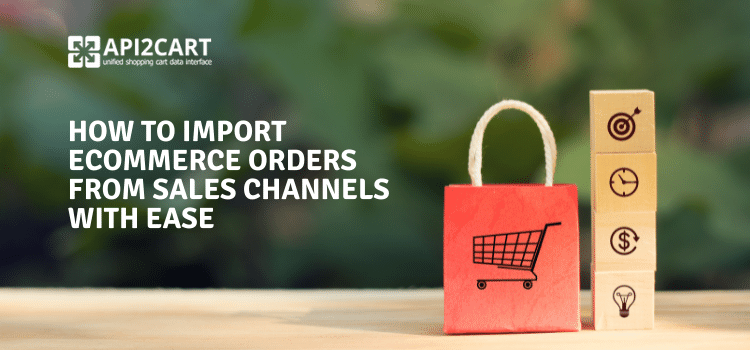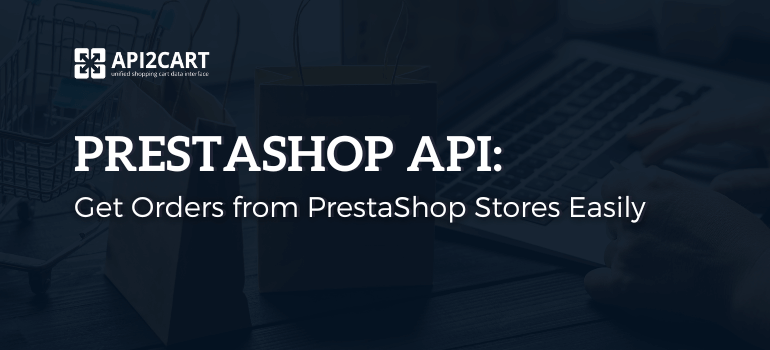
It's no secret that eCommerce businesses rely on sales channels to reach new customers and drive revenue. In fact, according to a recent study, the average eCommerce business uses 3.9 sales channels. While having multiple sales channels is essential for growth, it can also make order management a challenge.
Fortunately, there are many eCommerce software that allow working with order data retrieved from online stores. Systems such as marketing automation software use this info to send personalized emails, order statuses, or repurchase reminders. For order and inventory management systems, retrieved order info can be useful because they provide the features like order fulfillment, report creation, etc.
Retrieving such data can be done by integrating with eCommerce platforms and marketplaces. The connection allows software providers to import orders, products, customers, and other needed info from online stores. Also, to gain a deeper understanding of how to retrieve order data from multiple eCommerce platforms, refer to our comprehensive guide on How to Get Order Data from Various Shopping Platforms via One API.
But manually developing a connection usually takes too much time, and it is often an expensive process. This article will show you how to easily and quickly integrate your eCommerce software with shopping platforms and import eCommerce orders from your clients' stores.
What is an Order Import?
An order import refers to the process of transferring order data from one system to another. The best way to import orders is via API because it saves time and make the process automatic. The data that is imported usually includes the customer's shipping information, the items ordered, the total cost of the order, etc.
Features that Can Be Implemented with Imported Order Data
The list of software vendors that must import eCommerce orders to implement their functionalities is extensive. Having access to such store data they can provide the following features for online store owners as inventory synchronization, order status notification, product recommendations, etc. Let’s see in detail some popular features that deal with order data.
- Inventory synchronization. Online merchants are in need of real-time inventory synchronization. To develop this feature software should be integrated with eCommerce platforms. Moreover, it should have the mechanism of importing order data and syncing product info across different sales channels.
- Personalized emails. Order, customer, and product data allow eCommerce software like marketing automation systems to send personalized emails to their clients. Such emails contain info about new products, discounts, offers, product recommendations, abandonment cart notifications, and other personalized info.
- Order statuses notification. Software vendors like eCommerce marketing automation, cart abandonment software, or chatbots can provide the functionality to notify end customers about the status of their orders, track cart abandoners, etc.
- Reports and statistics. One of the important aspects of online shopping is analysis. Store owners can use order data for generating statistics, and special reports, to analyze which channels work best or what products are selling most often. This analysis can help them strategize their eCommerce operations.
Why Importing eCommerce Orders is Challenging
To attract new clients, software developers need to add the support of eCommerce integrations to SaaS applications. The more shopping platforms you have integrated, the more potential customers you may have. However, because integration is a complex and costly task, it can prove to be an obstacle to the performance level of SaaS software.
It can be difficult to integrate with a single eCommerce platform, and it becomes even more challenging when we talk about integrating with multiple shopping platforms. Because of this, most eCommerce software only integrates with a few shopping carts, losing many potential customers and sales. Integrating with various shopping platforms allows eCommerce B2B software to gather orders from multiple sales channels. As a result, online retailers can easily manage orders and distribute order and product information across different platforms. However, any SaaS software provider must remember that accessing order information requires significant technical ability, as each shopping platform has its method of data storage.
When shopping carts and marketplaces are updated, compatibility for new versions must be considered. SaaS application providers who do not have a specialized developer in staff will have to spend money on a system upgrade. Below we will show other issues associated with setting up the integration with multiple shopping carts and marketplaces.
Other eCommerce Integration Pitfalls
If SaaS software vendors want to dominate in the eCommerce market, then they need to integrate their products with different eCommerce platforms and marketplaces. However, each shopping platform has its unique structure, which is why each integration will have its own set of hurdles.
During the integration development, there might be several issues:
- First, the Integration is a complex process, so imagine how long it takes to set up multiple integrations with different shopping carts and marketplaces.
- It may not be a good idea to do the integration by yourself because you may not be familiar with all the technical issues of the specific shopping platforms.
- Updating the integration with different shopping platforms is one of the most time-consuming aspects of integration. You may have problems with updated versions of the eCommerce platforms because your programmers have focused on old versions of the shopping platform when setting up the integrations.
Because of these reasons, integrating with numerous shopping platforms is challenging, so it is vital to figure out how to make things as simple as possible. Third-party integration solutions are the best way you can choose.
The Solution to Easily Integrate With Shopping Platforms and Import eCommerce Orders
One of the easiest ways to connect to various shopping platforms and marketplaces is by using a third-party integration solution like API2Cart. It provides a unified API that allows connecting to over 60 different eCommerce platforms, including Wix, Magento, WooCommerce, Shopify, BigCommerce, Amazon, and many others at once.
API2Cart provides 100+ API methods for working with orders, products, prices, customers and other data you need.
For example, to import eCommerce orders, it gives you a few options:
- Webhook for order.add event
- Order.list method
By setting up webhooks for the order.add event, you will be notified each time a new order is placed. Webhooks are more profitable than APIs because they reduce server load, save API requests, and provide more up-to-date information.
New orders can be tracked by executing the order.list method regularly to get a list of orders that will be imported into your system. This method also allows filtering orders by id, store id, customer id, customer email, order status, order id, financial status, shipping provider, and time parameters such as create_from, created_to and modified_from, modified_to.
Conclusion
Importing orders from sales channels doesn't have to be complicated or time-consuming. By choosing the right integration solution, you can easily import eCommerce orders into your system so you can focus on running your business instead of developing multiple integrations.
For more information on how API2Cart can benefit you and help you, please contact us, and we will be happy to help you with any questions you may have. Give our service a try by taking advantage of our 14-day trial period.



